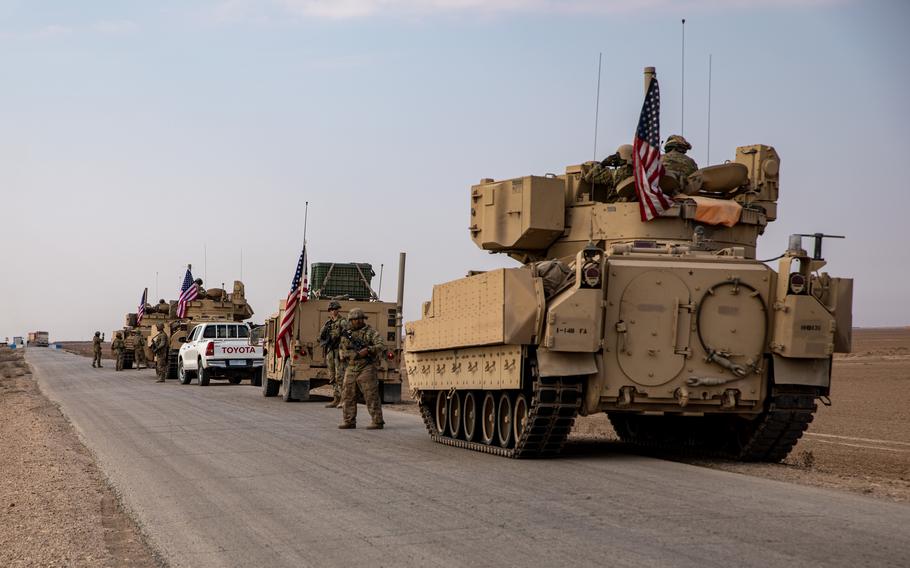
U.S. and Syrian Democratic Forces conduct a patrol in Syria, Jan. 26, 2023. A drone attack in Iraq last week that struck a convoy carrying U.S. troops and the SDF commander of anti-Islamic State forces led to some troops suffering traumatic brain injuries, U.S. military officials said. (Julio Hernandez/U.S. Army)
U.S. Central Command said Thursday that American troops did not suffer traumatic brain injuries during a drone attack on a convoy last week in Iraq, adding that its earlier statements indicating there had been injuries were due to a misunderstanding.
“We gave you incorrect information,” CENTCOM said in a statement late Thursday. “There were no injuries related to the attack on the convoy in Sulaymaniyah.”
The attack at the Sulaymaniyah airport in Iraq targeted a convoy that included U.S. troops and Gen. Mazloum Abdi, the Syrian Kurdish commander of anti-Islamic State forces.
A Stars and Stripes inquiry with the subject line, "Press request: Attack on convoy in Sulaymaniyah" including questions about Abdi and last week's attack was answered with responses about a different attack on U.S. troops last month, a CENTCOM spokeswoman said Thursday.
The drone that attacked the convoy missed by slightly more than 100 yards, CENTCOM spokesman Col. Joseph Buccino said in a phone call Thursday.
"It didn't hit anything in the convoy," Buccino said.
Abdi is the leader of the Syrian Democratic Forces, a Kurdish-led group that the U.S. has allied with in the fight against ISIS.
Responsibility for the strike has been widely attributed to Turkey, although Ankara has denied these claims.
The attack and its aftermath highlight the complicated nature of American relations in the Middle East, where troops tasked with containing ISIS are partnering with Kurdish units seen as threats by NATO ally Turkey, while also defending against attacks from Iran and its proxy militias.
Ankara believes that the U.S.-backed SDF is a terrorist group affiliated with Kurds waging an insurgency in Turkey that has left 40,000 dead, a January report by the Council on Foreign Relations said.
But the U.S. views the SDF as separate from Kurdish groups that have been blacklisted internationally for terrorism. Washington has worked with the SDF since 2014 to defeat ISIS.
Three U.S. military personnel were in the convoy with Abdi at the time of the attack, with one service member riding in the same vehicle as the general, The Wall Street Journal reported Friday.
Capt. Abigail Hammock, a CENTCOM spokeswoman, confirmed that the convoy had “included U.S. military personnel participating in routine operations with our partner forces in Iraq and Syria.”
Abdi said he was in Iraq with U.S. troops to talk with Kurdish anti-terrorism forces about fighting ISIS, Al Jazeera reported Sunday. The general called the attack a “clear message from the Turks,” the report said.
Unidentified Western officials also blamed Turkey for the attack in reports by The Wall Street Journal and the Al-Monitor news site. Iraq’s government held Turkey responsible and demanded an official apology Sunday.
Turkey said their military didn’t undertake any operations in the area that day, Reuters reported Sunday. The Turkish directorate for communications did not respond to questions sent by Stars and Stripes on Thursday.
CENTCOM didn’t mention Turkey or Abdi in its statements about the attack, saying only that it strongly opposes any action that threatens the safety and security of U.S. personnel.
Turkey has been launching attacks into Syria and Iraq for years, sometimes killing civilians and U.S.-trained SDF fighters, Myles Caggins III, a senior nonresident fellow at the New Lines Institute for Strategy, based in Washington, said Thursday.
Caggins, a retired U.S. Army colonel who served as spokesman for the U.S. task force against ISIS until September 2020, said the U.S. has been loath to acknowledge these attacks, except in vague terms.
“U.S. government officials are quick to point the finger when Iran conducts drone strikes and rocket attacks in Iraq and Syria, and yet when Turkey exhibits the same behaviors, Turkey is never named, and those strikes are always under investigation until the headlines disappear,” Caggins said. “In order for the U.S. to maintain credibility on the world stage, we must name names.”
The contradictions between U.S. support for both Turkey and the SDF will need to be resolved through diplomatic negotiation before matters escalate out of control, said Jonathan Lord, senior fellow at the Center for a New American Security, a Washington-based think tank.
“I think we've reached a breaking point where something has to give,” Lord said. “The administration needs to make this a top priority before our NATO ally ends up killing a U.S. soldier.”